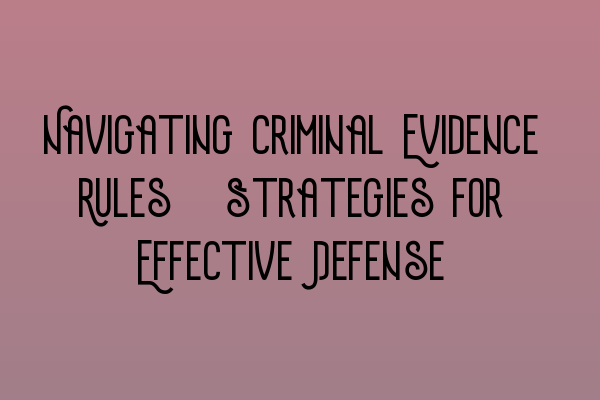Navigating Criminal Evidence Rules: Strategies for Effective Defense
When it comes to criminal cases, understanding the rules of evidence is crucial for a successful defense. As a criminal law solicitor at SQE Criminal Law & Practice Law UK, I am often faced with clients who are unaware of the intricacies involved in presenting evidence. In this blog post, we will discuss some key strategies to help defense attorneys navigate the criminal evidence rules effectively.
Understanding the Relevance of Evidence
The first step in building a solid defense is to understand the relevance of the evidence presented. SQE 1 Practice Exam Questions and SQE 1 Practice Mocks FLK1 FLK2 can be valuable resources for gaining a better understanding of different scenarios and how evidence plays a role in them.
By knowing what evidence is relevant, defense attorneys can strategically challenge the prosecution’s case. It is important to carefully analyze each piece of evidence and determine its admissibility, credibility, and weight in court.
Investigating the Chain of Custody
In many criminal cases, physical evidence is presented to support the allegations. As a defense attorney, it is essential to investigate the chain of custody for such evidence. SQE 2 Preparation Courses can provide comprehensive knowledge on how to approach this aspect effectively.
The chain of custody refers to the documentation of the handling and storage of evidence from the moment it is collected until it is presented in court. By scrutinizing the chain of custody, defense attorneys can identify any potential mishandling or tampering of evidence, which can weaken the prosecution’s case.
Challenging Expert Witness Testimony
Expert witnesses often play a crucial role in criminal trials, providing opinions and interpretations based on their specialized knowledge. However, defense attorneys should not shy away from challenging the credibility and reliability of expert witnesses’ testimony.
It is important to thoroughly research and understand the background, experience, and qualifications of the expert witness. SQE 1 Preparation Courses can equip defense attorneys with the necessary skills to effectively cross-examine expert witnesses and expose any biases, conflicts of interest, or lack of reliability in their testimony.
Utilizing Exclusionary Rules
Exclusionary rules, such as the exclusionary rule of hearsay evidence, can be powerful tools for defense attorneys. These rules dictate that certain types of evidence are inadmissible in court, as they are considered unreliable or violate the rights of the accused.
Having a solid understanding of the various exclusionary rules is essential for defense attorneys. By skillfully utilizing these rules, attorneys can suppress damaging evidence and create doubt in the prosecution’s case.
Staying Up-to-Date with Legal Developments
Criminal evidence laws are constantly evolving, influenced by new precedents, statutes, and legal interpretations. As a defense attorney, it is crucial to stay up-to-date with these developments.
SRA SQE Exam Dates can assist defense attorneys in planning their study and preparation to stay abreast of the latest legal developments. Additionally, attending seminars, workshops, and conferences focused on criminal evidence can provide valuable insights and networking opportunities.
Conclusion
Navigating the complex web of criminal evidence rules requires a comprehensive understanding of the law, strategic thinking, and attention to detail. By employing the strategies discussed above and seeking further knowledge through related articles, defense attorneys can build a strong defense, protect their clients’ rights, and strive for justice.
